Who is Nityananda? What is Nityananda?
Nityananda is not His name, for He has no name, for He is that One that sprung out of light of God and united back with it. His physical body was referred to as “Rama” in His childhood by His foster father, who while dying in His son’s arms being blessed with the vision of his God, exclaimed “Nityananda!” – ‘nitya’ meaning eternal and ‘ananda’ meaning bliss. Thus, His name came into form as people addressed Him as Nityananda. He lived his life justifying this name as to being in eternal bliss at all times.
Why is He referred to as Bhagwan?
Nityananda is put at the stature of Bhagwan (meaning God) and is very rightly referred to as Parabrahma, because He was the spark of God consciousness itself that took human form for elevation of human suffering. Planet earth has seen throughout evolution that divine personalities have manifested on earth to support and guide people onto the righteous path so that man can liberate from the sufferings of the endless cycle of births and deaths.
The entire selfless life of Bhagwan illustrates how difficult it had been for someone with such high elevated level of consciousness to remain and do work in the human body because it is challenging for souls of Supreme consciousness to be limited in a physical body with so many limitation, but nevertheless such great souls do take human bodies only to be among other beings in the earth plane and to perform their missions.
Thus, Bhagwan Nityananda stepped down into planet earth for you and me.
Nityananda’s nondualistic characteristics
Bhagwan always was in the unified state with God. Living in the nondual state, He never discriminated between people and other living beings and even among humans never made any distinction in sex, colour, caste, religion, status, etc. He often demonstrated the nondualistic state through examples like being in an unaltered state while covered in comforts or in a pile of filth. He always referred to Himself as “This one”, often making statements like “This one has no Guru, This one has no disciples.”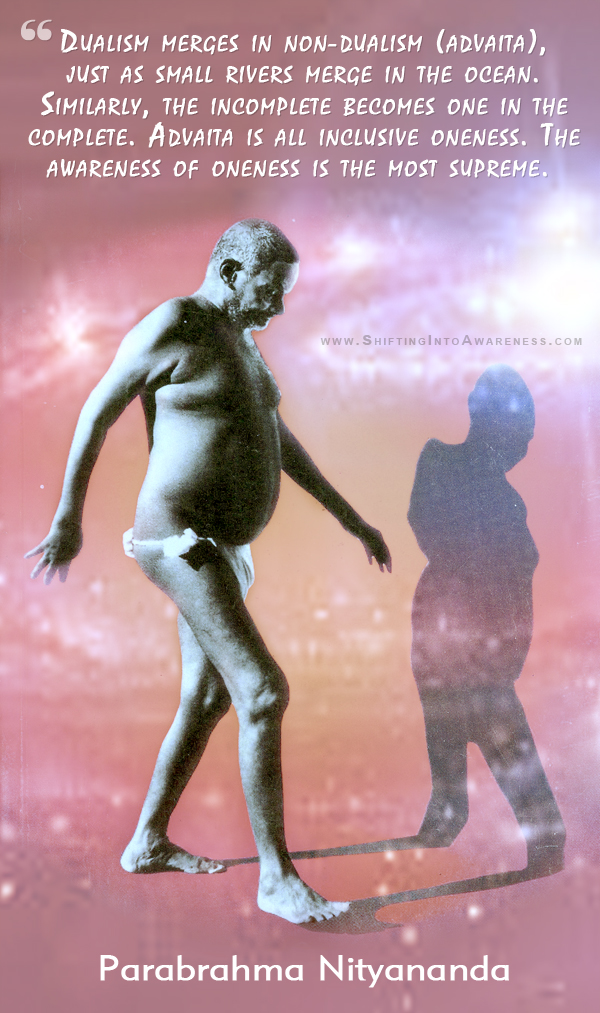
He never taught any particular methods nor created an ashram or cult, but always encouraged all those who came to Him to follow what they were following with a pure mind. This can be seen in His varied advices and solutions to offering some devotees Shaktipat, while some chanting, while some pranayam, while some bhakti, while some directed to Karma yog, while householders to lead a family life, etc. Knowing that every individual was undergoing their own karmic consequences, He never interfered with the laws of Karma but at the same time never ignored anyone who implored for His help, by resolving things through His leelas (divine plays). This was all done without the least of any discrimination of any dualities and done in total Oneness of the entire creation.
Miracles of Nityananda
Bhagwan Nityananda while walking around in his physical body performed many live miracles like raising the dead, healing the sick, giving divine visions to the worthy, manifesting food and other human necessities out of thin air, building huge 43 caves packed with divine powers in Kanhangad bare-handed yet a masterpiece, appearing in multiple locations at the same 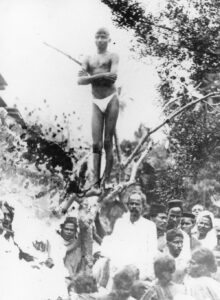 time, presenting Himself before devotees calling out for His help, saving many from mishaps, stopping trains, presenting with tickets holding a future date, narrating live episodes of the Round Table Conference happening in London, which later came out in Newspapers, sleeping on hot sands gazing directly into the sun, photographs denying to show His physical presence, picking out the exact needed amount to pay dues from his loin cloth, bringing rain, waking in the rain without getting wet, walking on water, giving many material and spiritual boons, endowing many with liberation, and many, many such miracles that were seen by people and events recorded. It was also seen that anyone who tried to harm Him in anyway had only brought misery, pain and even death to themselves. At times a whole village suffered the wrath by floods or other calamities whenever He was tried to be harmed in any way.
time, presenting Himself before devotees calling out for His help, saving many from mishaps, stopping trains, presenting with tickets holding a future date, narrating live episodes of the Round Table Conference happening in London, which later came out in Newspapers, sleeping on hot sands gazing directly into the sun, photographs denying to show His physical presence, picking out the exact needed amount to pay dues from his loin cloth, bringing rain, waking in the rain without getting wet, walking on water, giving many material and spiritual boons, endowing many with liberation, and many, many such miracles that were seen by people and events recorded. It was also seen that anyone who tried to harm Him in anyway had only brought misery, pain and even death to themselves. At times a whole village suffered the wrath by floods or other calamities whenever He was tried to be harmed in any way.
The arrival of Nityananda
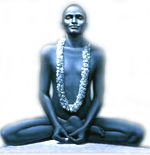 Bhagwan Nityananda was found as a little infant in the dense jungle of Quilandy, Kerala, guarded by a cobra that left the place when a woman came by. The woman who was a poor servant of Ishwar Iyer, then took the child to Ishwar Iyer and his wife.
Bhagwan Nityananda was found as a little infant in the dense jungle of Quilandy, Kerala, guarded by a cobra that left the place when a woman came by. The woman who was a poor servant of Ishwar Iyer, then took the child to Ishwar Iyer and his wife.
 An astrologer once remarked that the child was none other than the divine incarnation of Lord Shiva. He was named as “Rama” and grew up doing many leelas in childhood in these area. During the age of 10, when he was accompanying his foster father to the Himalayas, “Rama” bid goodbye stating that he would return soon. Moving in the Himalayas and the holy places there was also for some purpose known only to Him as He did not need meditation or austerities for He was born realized. This can be confirmed in His reply when a woman saw Him resting with eyes closed and she mentioned to another woman that He must be meditating. To this, Nityananda replied, “All of that was done in the mother’s womb.” This indicated that He was already “aware” of His existence in God even before He was born. He returned after 6 years during the marriage ceremony of Ishwar Iyer’s daughter after which Shri. Iyer fell ill. “Rama” fulfilled his father’s wish of wanting to have the vision of Surya Narayan (Sun God) by placing the dying father on his laps.
An astrologer once remarked that the child was none other than the divine incarnation of Lord Shiva. He was named as “Rama” and grew up doing many leelas in childhood in these area. During the age of 10, when he was accompanying his foster father to the Himalayas, “Rama” bid goodbye stating that he would return soon. Moving in the Himalayas and the holy places there was also for some purpose known only to Him as He did not need meditation or austerities for He was born realized. This can be confirmed in His reply when a woman saw Him resting with eyes closed and she mentioned to another woman that He must be meditating. To this, Nityananda replied, “All of that was done in the mother’s womb.” This indicated that He was already “aware” of His existence in God even before He was born. He returned after 6 years during the marriage ceremony of Ishwar Iyer’s daughter after which Shri. Iyer fell ill. “Rama” fulfilled his father’s wish of wanting to have the vision of Surya Narayan (Sun God) by placing the dying father on his laps.
Nityananda in Guruvan
 Bhagwan then wandered Kerala as a naked Avdhoot, performing many miracles. He was often misunderstood to be a mad person due to His behavior that resulted from Him being always immersed in the Supreme Consciousness and hardly had in His physical body. He later arrived at Guruvan (Kanhangad) where he dwelt in a natural cave atop the Guruvan hill full of wild animals and snakes. In this area where water lacked, He hit a rock from where sprung fresh waters which is even today flowing which Nityananda called “Papanashini Ganga”, which when bathed in absolves one’s karmas (sins).
Bhagwan then wandered Kerala as a naked Avdhoot, performing many miracles. He was often misunderstood to be a mad person due to His behavior that resulted from Him being always immersed in the Supreme Consciousness and hardly had in His physical body. He later arrived at Guruvan (Kanhangad) where he dwelt in a natural cave atop the Guruvan hill full of wild animals and snakes. In this area where water lacked, He hit a rock from where sprung fresh waters which is even today flowing which Nityananda called “Papanashini Ganga”, which when bathed in absolves one’s karmas (sins).
Nityananda in Kanhangad
Bhagwan came to Kanhangad and converted a large piece of rock land in the Hosdurga Fortress into 43 mystical caves, in which He Himself dwelled most of the time. Here, also all were mystified with His leelas of paying the exact amount to His helpers from His loin cloth. Though, these caves were built without any engineering support, the 43 caves that look like a brain with the left and right hemisphere, has six entrances through which light and air always keeps the caves ventilated and lit. Much more delight is in seeing beyond the physicality of these caves; as a storehouse of divine energies that Bhagwan Himself prepared for future generations. He even indicated that these caves would be used by divine beings in the satyug (golden era). For those, who are surrendered to Him and His ways, these divine caves offer spiritual rewards. It is known to have been remarked by Bhagwan that those who meditate in these caves would be ensured a speedy spiritual growth. Later, before leaving towards Ganeshpuri, Bhagwan handed over the responsibilities of this place to His devotee Baba Janananda, who worked earnestly till His last breath, to make Kanhangad and Guruvan more accommodative to visitors what it is today.
Nityananda in Ganeshpuri
Bhagwan wandered through many places in Kerala and Karnataka (most of which places ashrams of Bhagwan Nityananda have sprung up) before He reached Akroli near Vajreshwari, near the base of the Mandakini Mountain. From here He move a little further to Ganeshpuri near an ancient Bhimeshwar (Shiva) temple just besides three hot sulfur springs. This piece of waste land that was inhabited by wild beasts and tribals, slowly turned into a holy pilgrimage spot, where in the following years thousands thronged to have His darshan.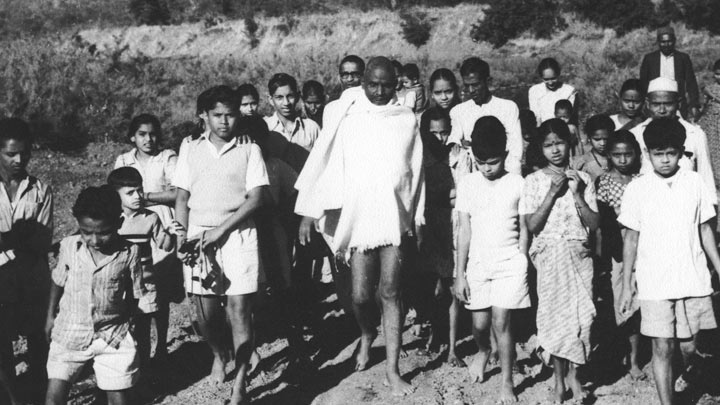
After coming to Ganeshpuri, Bhagwan Nityananda lived here till His Mahasamadhi performing countless miracles. Many devotees had divine sightings of divine beings that descended to have His darshan, including Mother Bhadrakali Herself, for which Bhagwan instructed the temple of Maa Bhadrakali be built.
The departure of Nityananda
Bhagwan Nityananda was well aware of His divine purposes and stay on earth. Totally, doing with the will of God, Bhagwan gave the best of directions and guidance to the world along with His very practical way of living and teaching “Do what you speak and speak what you do.” At a certain time in 1922 in Mangalore, when He observed that people did not wish to mend their ways, He once sat in a devotee’s home, totally still for hours with no signs of life in Him. Confused devotees waited for Him but 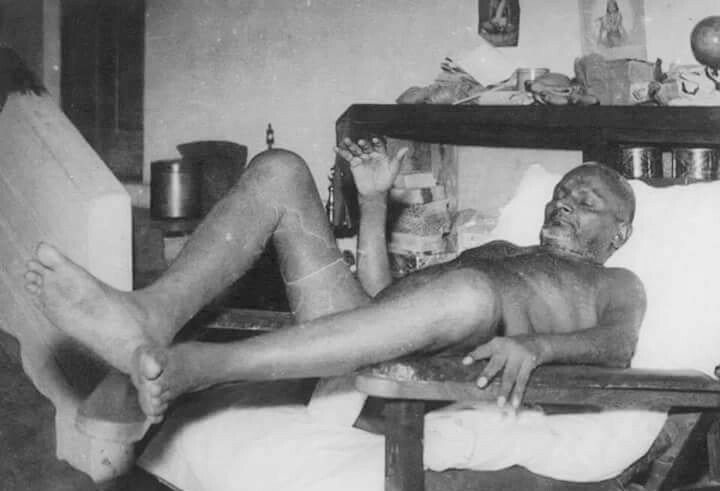 after a night’s wait when they found that there was no pulse or breath in Him, they confirmed that He had taken Mahasamadhi. The following day Bhagwan Nityananda suddenly moved and stretched His limbs giving a dazzled look to all around. In His heavy state of high consciousness He spoke in bits that since nobody understood Him, He had left His body but then five Sages in the astral plane told Him that ‘His time was not yet up and there was more work to do’ and thus He returned back. By the time, Bhagwan became aware of His surrounding and stopped speaking about it and never mentioned again about it.
after a night’s wait when they found that there was no pulse or breath in Him, they confirmed that He had taken Mahasamadhi. The following day Bhagwan Nityananda suddenly moved and stretched His limbs giving a dazzled look to all around. In His heavy state of high consciousness He spoke in bits that since nobody understood Him, He had left His body but then five Sages in the astral plane told Him that ‘His time was not yet up and there was more work to do’ and thus He returned back. By the time, Bhagwan became aware of His surrounding and stopped speaking about it and never mentioned again about it.
Two months before Bhagwan attained Mahasamadhi, He had hinted to many about His departure. He gradually withdrew from eating and had become lean. Concerned devotees and various doctors offered their treatment to Him, but He who gave life and health to so many, did not wish to continue but He respected all the attempts of His devotees as their love and concern for their Master. Nearing His departure, certain hints were observed by His close devotees such as oozing of His ear, a sign of physical cleansing, and when a devotee, Mantrasiddhibai, cried on understanding this, He remarked, “Why cry? Stop. There is greater work possible on the subtle plane than the gross.” In the background, lot of subtle work was going on in the Gurumandala. A 9-year-old boy of a devotee, Shri. Padlaskar, had told his parents on the morning of the Mahasamadhi that they should leave for Ganeshpuri as an assembly of sages (gurumandala) were waiting for Him as He alone could avert the negative influence of the Ashtgraha Yoga befalling the world in the February 1962. This is an astrological indication of great mishap to the world. A close devotee on knowing His master’s time of leaving had neared, begged Him to postpone His leaving, to which Bhagwan Nityananda mentioned that it was only possible if a devotee such as Pundalik, had selfless devotion and love, to which His devotee wept. On 08/08/1961 (1+9+6+1=8) at around 10.43 a.m. (1+0+4+3=8), Bhagwan Nityananda took a couple of deep breaths and left His physical body. The number 8 symbolizes the symbol of infinity. One the last sentences that He spoke was “As long as the world exists, I shall be with you.”
Nityananda’s Life
Bhagwan Nityananda never preached or advocated anyone on following any particular method, faith, tradition, God, religion, etc. He simply enhanced people’s life by uplifting them from their problems, often from the issues that were the root causes of their karmic suffering.
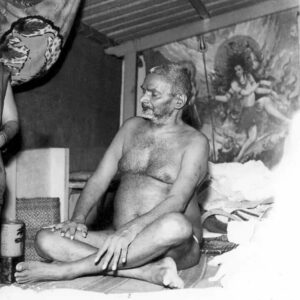 Though He knew everything and was aware of every little thing that happened in the Universe, He hardly spoke anything, unless provoked by a keenly pure heart, but that too remained mumbled in His words and actions that cannot match the normal human vocabulary. He was very spontaneous and often did many, many things which were hard to understand by people around, but all His actions had very deep significance to what He was upto. Though everything in Creation was at His feet, He chose nothing from the world except a loin cloth, which also He wore to keep the dignity of people around. He roamed naked until He was requested by the British to wear ‘something’ as it was embarrassing to them. All that He was touched by was devotion and purity. These two factors made many people around Him to receive His grace and blessings, many of whom then walked the earth spreading His flame of Divinity. Many great saints, politicians and influential people used to visit Him, but He always remained the same to everyone. Nothing affected him – His own physical condition or any external situation for He always remained absorbed in Samadhi. All His leelas and miracles were very spontaneous demonstrating of Him not having to ‘use’ His divine powers. He never gave preaching of God to anyone but took care of simpler aspects of human life like feeding the poor children and fulfilling the basic needs of human life. He was and is the Messiah of the poor.
Though He knew everything and was aware of every little thing that happened in the Universe, He hardly spoke anything, unless provoked by a keenly pure heart, but that too remained mumbled in His words and actions that cannot match the normal human vocabulary. He was very spontaneous and often did many, many things which were hard to understand by people around, but all His actions had very deep significance to what He was upto. Though everything in Creation was at His feet, He chose nothing from the world except a loin cloth, which also He wore to keep the dignity of people around. He roamed naked until He was requested by the British to wear ‘something’ as it was embarrassing to them. All that He was touched by was devotion and purity. These two factors made many people around Him to receive His grace and blessings, many of whom then walked the earth spreading His flame of Divinity. Many great saints, politicians and influential people used to visit Him, but He always remained the same to everyone. Nothing affected him – His own physical condition or any external situation for He always remained absorbed in Samadhi. All His leelas and miracles were very spontaneous demonstrating of Him not having to ‘use’ His divine powers. He never gave preaching of God to anyone but took care of simpler aspects of human life like feeding the poor children and fulfilling the basic needs of human life. He was and is the Messiah of the poor.
Nityananda – The Perfect One
Nityananda lived practically of what He spoke of how a perfected being should be – the one who has conquered death and birth, who has no consciousness of the body, who has gone beyond all Gunas (qualities), who is the knower of the “Omniscient Light”, and who has no consciousness of the “I”.
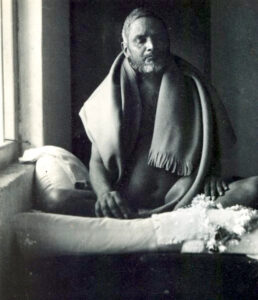 He further mentioned that when such a perfected being comes to any place, he feels glad to see anyone and everyone for he has no consciousness of duality though he moves here and there. He has no hunger and eats plenty if he gets plenty of eatables but if he does not get, he will never ask anybody. To such a perfect being the one who give him poison are the same like the one who give him milk. The ones who beat him are the same like the one who loves him. For such a perfect being, there are no relations because the whole Universe is the father, the mother, and relatives because He lives in the Universe and the universe lives in Him.
He further mentioned that when such a perfected being comes to any place, he feels glad to see anyone and everyone for he has no consciousness of duality though he moves here and there. He has no hunger and eats plenty if he gets plenty of eatables but if he does not get, he will never ask anybody. To such a perfect being the one who give him poison are the same like the one who give him milk. The ones who beat him are the same like the one who loves him. For such a perfect being, there are no relations because the whole Universe is the father, the mother, and relatives because He lives in the Universe and the universe lives in Him.
Nityananda’s Eternal Presence
Bhagwan Nityananda often stressed the least importance of having a physical body for Him to take care of His devotees. He assured His devotees before leaving that He would be more powerful to work from the subtle spheres as He would not be restricted by limitations of a human body. Even when He was in His physical form, not everyone had the opportunity to go and meet Him and put forth their needs and requests, but many benefited largely just with their intentions and faith in Him from far distances. Many examples of people show that He reached them anywhere to aid them. Even after His Mahasamadhi, as He indicated, He has been continuing to help so many devotees. In fact, His devotees multiplied manifold after He left His body, which shows His universal presence. Many even today receive healing and blessings through even His photographs, books, or even by narration through someone about Him. In many reported cases there have been devotees who have had His physical presence throughout the world. It all depends on the intensity of one’s faith and love towards Him. Even today, Shaktipat takes place in Ganeshpuri and Kanhangad and at many of His devotee’s ashrams, proving His Omnipresence to worthy and genuine seekers.
 There were many powerful Gurus of today who were empowered by Bhagwan Nityananda not only when He lived in His physical abode but also after His Mahasamadhi. Since His teachings does not involve any particular lifestyle or rules or customs and were nonbinding, many find easy to follow His teachings in practical life irrespective of what they follow in spirituality. They also find the needed guidance and help from Him at all times. Bhagwan Nityananda brought down eligibility for His grace and eligibility to spiritual ascension with just one simplest yet powerful need – PURITY of the mind.
There were many powerful Gurus of today who were empowered by Bhagwan Nityananda not only when He lived in His physical abode but also after His Mahasamadhi. Since His teachings does not involve any particular lifestyle or rules or customs and were nonbinding, many find easy to follow His teachings in practical life irrespective of what they follow in spirituality. They also find the needed guidance and help from Him at all times. Bhagwan Nityananda brought down eligibility for His grace and eligibility to spiritual ascension with just one simplest yet powerful need – PURITY of the mind.
Nityananda’s Teachings
Bhagwan’s teachings were very spontaneous and simple. Some of what he on and often mumbled were recorded in bits by one of His prime devotee – Tulasi Amma and few others, through whom the world got to know about what Bhagwan Nityananda expressed, all in the form of a book that Tulsi Amma offered – “Chidakasha Gita”.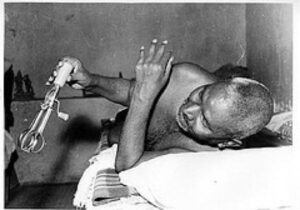
Since, the words in the quotes are His direct words that were mentioned in high states of consciousness, their deep profound meanings still has to be decoded to make it simple to the reach of the common man. He almost always spoke with examples to make His expressions clear. It is noteworthy to bring out some of His basic teachings in the most simplest words with gratitude to Tulsi Amma:
Living a pure life with Sadbhavana (purity).
- Keeping the mind like a lotus leaf floating on the water, keep the mind pure and untainted by desire while being immersed in worldly duties.
- Keeping the mind fully detached but attached to God, never allowing it to be affected by joy or despair.
- Mind is the root cause of bondage to birth and death cycle and mind is also the root cause of liberation from this cycle of birth and death.
- First the mind has to be trained to be silenced and then the silenced mind must be established in the real Self.
- There would be various tests of the mind, emotions, and body, with God waiting for one’s reaction to every thought that pops into the mind. Thus, staying alert and detached.
- Seeing everything that happens in life as an opportunity to gain experience, improvise, and keep rising to higher levels.
- All bring nothing into this world and can take nothing away from it.
- The cause of suffering in the world is desire alone.
- Desires are born with the awareness of a person is outward rather than inward.
- Desire for objects can disappear only when subtle intelligence develops through consistent practice of the mind.
- Liberation does not come searching for humans but humans must make efforts to get liberated.
- Real fulfillment comes not from fulfilling desires but by the dissolving of the “you” and “I” (duality) after which one is self-realized.
- The one who is not affected by praise or insult is the one who is selfless and such a person sees God in everything.
- Distinctions are made by those who are proud and jealous, who holds discussions about other religion, tradition, cult, and people, and who talks bad behind other people’s backs.
- God does not do good or bad to man but it is only due to the man’s good or bad thoughts that he reaps the circumstances in his life.
- A man who is protected by his good thoughts cannot be harmed even by a cannon shot.
- To a good man every man is good and everything is good. You are what you see in others. The world is your own reflection.
- Real results of tapas (austerities) does not come from desiring the results of the tapas, even if the tapas is done for hundreds of years but tapas done for just a few minutes with no desire of fruits, will reveal within oneself that God is in all and all are in God.
- God looks at everyone, everyone knows about God but hardly a few look towards God just like the everyone knows of the existence of the sun that shines on all but very few look at the Sun.
- You must makes attempts to save a bad person by trying to correcting him and not think that he would always remain bad just like you would save a person fallen in the well irrespective of knowing he is good or bad.
- However wicked or evil a man may be, any moment his wickedness may be changed into goodness. His goodness could not be seen just like the clouds are do not allow the sun’s rays to be seen but as soon as the clouds scatter away, the sun rays emerge.
- Moderation should be maintained in food habits by filling half the stomach with food, one-fourth with water and one-fourth empty.
- One must be regular in taking meals but must not eat when the stomach is full.
- There is nothing like good food and bad food because fire consumes everything without distinguishing between good and bad. Similarly, a man who is toiling hard can eat anything and everything will be digested. The ones who do not labour are not aware of what to eat and may suffer from indigestion.
- Too much of sleep must be avoided.
- The attachment to wealth is the cause of fear because the one who wears gold chains, rings and jewels are always afraid of being robbed.
- Fear is the creation of the mind that comes from the awareness being outward.
- As the brain of a six-month old child is still not developed, it remains indifferent to duality having no idea of the body. Such a child will not even knowing the difference between a diamond and a lump of earth because the Prana of the child is always in the Sushumna.
- Those who have destroyed the mind have no more vasanas (cravings). A diamond is purchased for a huge amount of money but to those who have transcended desire, a diamond is nothing but lump of earth.
- The nature of properties of earth cannot be changed by merely imagining it to be sugar. Similarly, even a Yogi who has realized the self, still is subject to the limitations of the body. They may be unaware and unaffected of their bodily conditions just like a man feels nothing when even a cobra bites him in deep sleep.
- Liberation depends on the nature of your devotion, the stronger the devotion the faster, just like the more hard you work the more salary you receive.
- Say what you do and do what you say. You must speak from what you experience and not from hearsay.
- If you keep a seed in a box, it will not yield anything but if sowed in the soil and cultivate it, it will yield plenty. From one lamp you can light a thousand lamps.
- You cannot cross the river even in a boat if you are afraid of water and you cannot heat water if you are afraid of fire. Fear must be banished from the mind because mind is the cause of anything we do.
- The more you cover your body, the more colder you feel and the more one decorates their bodies, the more prouder they will feel. More of inner work is needed than the outer because outer cleaning is to show others and inner cleaning is for one’s own benefit.
- The knowledge of God must be imparted to others so that others also understand it but first one must realize oneself and then impart it to others.
- Faith and devotion are important because without faith there can be no devotion.
- Human life is not easy to get, so when one has got it, all efforts must be made for liberation, which is the goal of life, which is achieved through desirelessness.
- He is not an outcaste whose skin is black or whose clothes are black but an an outcaste can be a person who has a turban on his head and wristwatch on his wrist if he does not recognize the oneness in all. He is not an outcaste who is a pauper but he is an outcaste who is selfish, jokes and mocks at others, and who has pride and envy.

